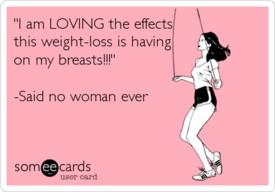Mathematics of Weight loss - How to really lose weight.
Replies
-
As an addendum to the original video, this is another one that talks about the psychology of weight loss and what the difference is between a person who successfully loses weight and keeps it off and those who don't:
 http://www.youtube.com/watch?v=NWfqBy4sSD8 0
http://www.youtube.com/watch?v=NWfqBy4sSD8 0 -
Awesome!!! Thanks for sharing! !!!0
-
This is a cool video!Thinking more about it, I'm a little puzzled why he says part of it is not turned into heat. I understand the units don't match up but the fat contains "calories" as potential energy within the chemical structure, just like dietary fat and carbs which are also made of C, H and O.
When the cell breaks down the fatty acid to produce ATP, heat should be generated.
I remember reading about why this is a while ago, but I don't remember offhand. I'll repost if I can find it.
I think he is oversimplifying it a bit. Heat is a byproduct of every chemical reaction because some energy is always lost. Isn't that why our bodies are hot? (and I mean that in every sense of the word)
I think thermoregulation is an independent process and not necessarily related to fatty acid metabolism, but I could be wrong about that. Biochem isn't my strong suit, but I'm really interested to learn so hopefully someone can chime in with more information.
Thermoregulation in the sense of staying within a narrow temperature range, yes, but what determines our basal temperature? I would think heat generated in cellular metabolism would play a role, but I'm not sure. It's probably easily googlabe but I think I will sleep on that mystery tonight...0 -
Bump0
-
This is a cool video!Thinking more about it, I'm a little puzzled why he says part of it is not turned into heat. I understand the units don't match up but the fat contains "calories" as potential energy within the chemical structure, just like dietary fat and carbs which are also made of C, H and O.
When the cell breaks down the fatty acid to produce ATP, heat should be generated.
I remember reading about why this is a while ago, but I don't remember offhand. I'll repost if I can find it.
I think he is oversimplifying it a bit. Heat is a byproduct of every chemical reaction because some energy is always lost. Isn't that why our bodies are hot? (and I mean that in every sense of the word)
I think thermoregulation is an independent process and not necessarily related to fatty acid metabolism, but I could be wrong about that. Biochem isn't my strong suit, but I'm really interested to learn so hopefully someone can chime in with more information.
Thermoregulation in the sense of staying within a narrow temperature range, yes, but what determines our basal temperature? I would think heat generated in cellular metabolism would play a role, but I'm not sure. It's probably easily googlabe but I think I will sleep on that mystery tonight...
Basal temperature is strongly negatively correlated with body mass in mammals (e.g. cats have higher basal body temperature than humans). I think it mostly has to do with proper functionality of chemical processes within the body. I'm not certain if the heat generated as a byproduct of cellular reactions whose primary function in the body is to transform one molecule to another is enough to establish basal temperature alone. I suspect that it plays some role, but I'm not sure. It's a good question.0 -
I'm glad he mentions ketosis and how it can be unhealthy. Everything in moderation - eat whole not processed - get moving!
Thanks for the link!0 -
Thanks that was very informative.0
-
Bump seriously cool0
-
Interesting video, but his chemistry is a little off. To lose 10kg of fat, you have to exhale about 29.2kg of CO2 and about 12kg of H2O (he kinda ignores the whole stoichiomatry bit in his math). To those trying to figure out how calories fit into this business, the short of it is that anytime a chemical bond is formed or broken, energy is absorbed or released. This is usually calculated in joules (which can readily be converted to calories). Depending on how our body metabolises(does a chemical reaction with) a given molecule will control how much useable energy we get out of it. With regards to thermoregulation, our body constantly produces heat as a by product of metabolising molecules. If we get too hot we cool off with perspiration. If we get too cold we start to shiver. This is because as we shiver we move and as we move we burn energy so our body metabolises more in order to produce heat to try and heat us up. Of couse the more in detail you look at this stuff, the more complex it gets.0
-
Bump to check out later
 0
0 -
bump to look at later
 0
0 -
Bump0
-
Tagging to nerd out later0
-
Bump for later.0
-
Tag for later0
-
I'd have enjoyed science a hell of a lot more with him as my teacher...!0
-
This content has been removed.
-
Bump0
-
Bump0
-
Bump0
-
BUMP0
-
Bump0
-
Fascinating.0
-
Ok I'm in for nerdeness0
-
Thanks for sharing, an interesting talk!0
-
interesting.0
-
Love TED talks!! Thanx for sharing!
 Eat less, move more and keep breathing... 0
Eat less, move more and keep breathing... 0 -
Bump to watch later.0
-
bump for later
 0
0 -
in for viewing later0
This discussion has been closed.
Categories
- All Categories
- 1.4M Health, Wellness and Goals
- 398.4K Introduce Yourself
- 44.7K Getting Started
- 261K Health and Weight Loss
- 176.4K Food and Nutrition
- 47.7K Recipes
- 233K Fitness and Exercise
- 462 Sleep, Mindfulness and Overall Wellness
- 6.5K Goal: Maintaining Weight
- 8.7K Goal: Gaining Weight and Body Building
- 153.5K Motivation and Support
- 8.4K Challenges
- 1.4K Debate Club
- 96.5K Chit-Chat
- 2.6K Fun and Games
- 4.8K MyFitnessPal Information
- 17 News and Announcements
- 21 MyFitnessPal Academy
- 1.5K Feature Suggestions and Ideas
- 3.2K MyFitnessPal Tech Support Questions


























